

Historical Significance. Things are often considered to be important if they do something new, which had never been seen before.
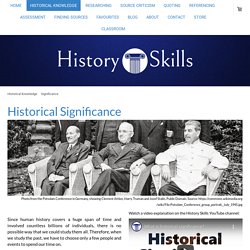
The word ‘novelty’ means “the quality of being new, original, or unusual“. This is often the way that people from the past measured the significance of people and events from their own time. When an event or person was mentioned by the people alive at the time, it usually shows us that they considered them to be particularly remarkable. Therefore, looking for what was novel, or “new”, about a person, event, location or idea, is often a good way to decide why it is significant. Things from the past can suddenly be considered significant because people have realised that they are applicable to something happening in the present. Top 10 Free Timeline Creation Tools For Teachers (2017 Update) - eLearning Industry. The Past: The Elephant in the Room of Diverse Societies? - EUROCLIO - European Association of History Educators. Dealing with sensitive histories through intercultural dialogue.

Geschiedenis en Didactiek. Organizing, and learning with, group projects. Cooperative learning series Learning and working in groups involves shared and/or learned values, resources, and ways of doing things.
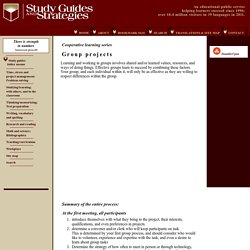
Effective groups learn to succeed by combining these factors. Home - History Skills. Practical Pedagogies 2016. Here are some materials kindly shared by session leaders with delegates.
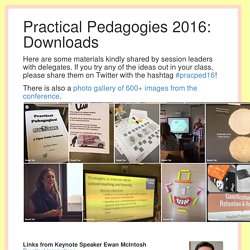
If you try any of the ideas out in your class, please share them on Twitter with the hashtag #pracped16! There is also a photo gallery of 600+ images from the conference. Links from Keynote Speaker Ewan McIntosh Practical inspirations Big ideas Case studies "Mucking in Together" Based on a case study, we will look at ways we can collaborate on creative projects and share them with a wider audience.Bryn Llewellyn @brynll / @tagtiv8 (Creator of Tagtiv8 Active Learning Games) "Uncovering History (not covering the curriculum) - The power of archives in the classroom" with @The_History_Man [link 1 | link 2] How can we engage students' curiosity and preconceptions to enable them to uncover the past and develop deep-learning?
"Fast, no-fuss learning ideas for historians - sans technology! " Quick and easy ideas to get students away from the laptops and talking about History.
Research. Historical thinking. Presentations. Reflecting. Source analysis. Reading skills. Class discussions. Essay writing. Harvard Referencing. MLA Referencing. History. Why Study History? (1998) By Peter N.
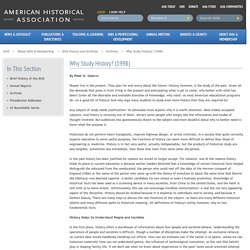
Stearns People live in the present. They plan for and worry about the future. History, however, is the study of the past. Given all the demands that press in from living in the present and anticipating what is yet to come, why bother with what has been? Any subject of study needs justification: its advocates must explain why it is worth attention. Historians do not perform heart transplants, improve highway design, or arrest criminals. In the past history has been justified for reasons we would no longer accept. History Helps Us Understand People and Societies In the first place, history offers a storehouse of information about how people and societies behave. The Importance of History in Our Own Lives These two fundamental reasons for studying history underlie more specific and quite diverse uses of history in our own lives. History Contributes to Moral Understanding History also provides a terrain for moral contemplation.
History Provides Identity History is useful for work. College: History: History Study Guides. Original guides and modifications of guides contributed by current and past History Department faculty members Kirk Jeffrey, Diethelm Prowe, Rachel Seidman, Harry Williams, Eleanor Zelliot, and others.
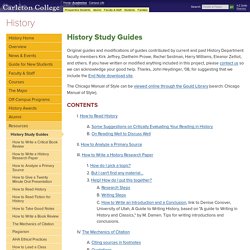
If you have written or modified anything included in this project, please contact us so we can acknowledge your good help. Six Habits of Highly Empathic People. If you think you’re hearing the word “empathy” everywhere, you’re right.
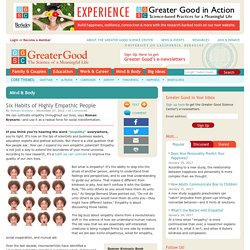
It’s now on the lips of scientists and business leaders, education experts and political activists. But there is a vital question that few people ask: How can I expand my own empathic potential? Empathy is not just a way to extend the boundaries of your moral universe. According to new research, it’s a habit we can cultivate to improve the quality of our own lives. But what is empathy? The big buzz about empathy stems from a revolutionary shift in the science of how we understand human nature. Over the last decade, neuroscientists have identified a 10-section “empathy circuit” in our brains which, if damaged, can curtail our ability to understand what other people are feeling. But empathy doesn’t stop developing in childhood. RSA Shorts - The Power of Empathy. Syria: A Children's Crisis? Virtual Classroom — Faculty of History. MYP Humanities. MYP Humanities at NIS encourages learners to respect and understand the world around them and equips them with a skills base appropriate for a learner in the 21st century.
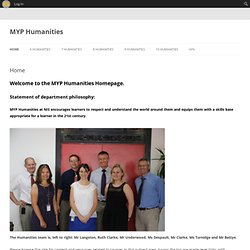
The Humanities team is, left to right: Mr Langston, Ruth Clarke, Mr Underwood, Ms Despault, Mr Clarke, Ms Turnidge and Mr Battye. Please browse this site for content and resources related to courses in this subject area. Across the top are grade level links, with sub-links to specific units. To access another subject area or school level, please go to the NIS logo in the upper left hand corner of the screen and choose from the drop-down menu. NIS Students and Parents: To access specific assignments and class details, please log in to your Veracross portal. MYP Humanities Guide 2014.